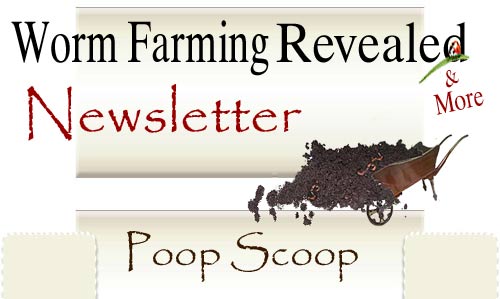| Back to Back Issues Page |
 |
|
Safe Versus Unsafe Worm Food - Why? February 15, 2024 |
Safe Versus Unsafe Worm Food
I will get into Safe versus Unsafe Worm Food in a minute. First let me explain why I haven’t sent you a newsletter in a while. Click the unsubscribe button below if you don’t remember signing up or the newsletter or it no longer applies to you. Only you can sign up for this newsletter, unless someone else has access to your email account. I know I haven’t written in a while, but you will be getting some emails with several articles (slowly) that I’ve written recently. I apologize, but the reason is the time it takes, along with understanding that I also hate too many newsletters from people I subscribe to. That’s the main reason. I just hate too many newsletters in my inbox. Maybe I’m not like you, but I hope you understand I only want to send you something that I know could be of importance. I don't push or promote my products nearly as much as others do. I only want to share important articles, information, or exciting things happening in the worm farming, gardening, and homesteading world. I’m NOT pushy and only write from the heart. Now let’s get into one of the latest articles I wrote about.
Safe versus Unsafe Worm Food.
The reason I’m discussing this is NOT because I want you to avoid certain foods in the worm bin, but because I want you to understand why you should avoid adding foods to a worm bin that most people don’t. I read, watch, and hear people try to oppose the idea of keeping certain foods out of a worm bin. I don’t know why. I’m sure they mean well, but there is a reason for coming up with “The List” of foods to avoid in a worm bin. What is the number 1 reason for this “list”? It depends on what your goals are for worm composting. Most people want to increase their worm casting and worm populations as fast as possible. Keeping out certain foods will ensure that your worm system will perform at optimal expectations. I KNOW we can add all types of produce, carbons, and manures, but the main reason for telling people to avoid this is simple. I DON’T WANT PEOPLE ANGRY AT ME! Sooner rather than later, I would surely get emails and nasty grams from people who add onions, yogurt, and other “unwanted” foods that worms will avoid until the food becomes stable enough to eat. Worms, simply, will not touch it until it has a chance to gas off certain nitrogens, salts, acidic ph levels, etc. I tell you this for the purpose to see you succeed. After that, you’re on your own. You can do whatever you want to, and there are people that do add "worm foods to avoid" but they have experience or they're familiar with composting worms and food rations. They have a routine. Adding “unsafe” worm food is tricky in the beginning and should only be done when you understand the whole process of a composting worm’s diet. No one will be able to explain to you why your worms are crawling out or why your worm bin stinks or why your worms won’t eat certain foods until you know exactly what a composting worm needs in its natural habitat. You’re the one who’s mimicking nature and you’ll need to understand the fundamentals of composting worms. This is so you can correct ANYTHING that goes wrong should the system fail for ANY reason. Go read the article. It's not too long of a read, but I think you’ll get more out of it than just worm foods to avoid. I hope the articles helps you understand more clearly, Pauly The eBooks have a lot of info you won't find on the website. No need to sift through misinformation. Let my Garden Pics prove I put my money where my mouth is. |
| Back to Back Issues Page |